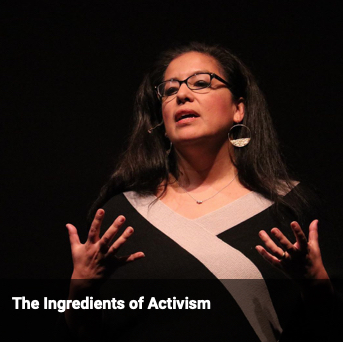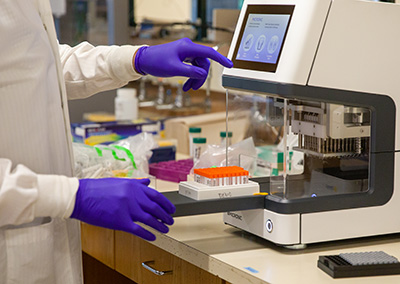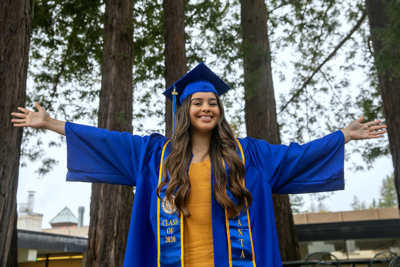Campus News
Year in Review: Campus successes tied to Principles of Community
While adapting to a global pandemic and responding to a massive wildfire, UC Santa Cruz has achieved some historic success.

Students gaze at the stars from the top of the Porter swiggle. (Nick Gonzales/UC Santa Cruz)
Diverse. Open. Purposeful. Caring. Just. Disciplined. Celebrative. The seven campus Principles of Community are at the heart of UC Santa Cruz and all that faculty, staff, and students accomplished this past academic year—despite the incredible challenges faced by campus.
While adapting to a global pandemic and responding to a massive wildfire, UC Santa Cruz has achieved some historic success. The accomplishments below represent only a fraction of what faculty, staff, and students have done together since last fall. They underscore the important role public research universities play in our world and set the stage for even greater accomplishments in the academic year ahead.
Diverse: Creating social mobility for students from all backgrounds
UC Santa Cruz debuted last fall as the second best university in the country for social mobility, according to the 2020 U.S. News and World Report rankings.
The first-ever social mobility list measures graduation rates for students who received federal Pell Grants, which are typically awarded to students who come from households that earn less than $50,000 annually. UC Santa Cruz students deserve this accolade for their resilience and hard work, and every UC Santa Cruz employee contributes to student success.
While there is much to do to ensure equity in graduation rates and fulfill the promise of access to higher education, for this fall, the campus admitted a cohort of students that reflects excellence and diversity. Nearly a third of admitted first-year students earned a GPA above 4.13 and 55 percent earned a GPA between 3.6 and 4.12. UC Santa Cruz also significantly increased the number of students admitted from low-income families, underrepresented groups, and those who will be the first in their family to earn a four-year degree.
The University of California is an equalizer for students from low-income families. UC alumni go on to earn as much as students who came from middle-income families, and their earnings double by a decade after graduation.
Open: Faculty share insights to inspire change
 Nine UCSC affiliates delivered stirring talks on the “Art of Hope” for TEDx Santa Cruz meant to inspire those in the audience to action.
Nine UCSC affiliates delivered stirring talks on the “Art of Hope” for TEDx Santa Cruz meant to inspire those in the audience to action.
Delivered just before a pandemic swept across the world, the talks are a strong antidote for these difficult times. Many of the talks are online, including “The Ingredients of Activism,” by Sylvanna Falcón, professor of Latin American and Latino studies; “The Philosophy of Hope and Despair,” by Kyle Robertson, co-founder of the Center for Public Philosophy; and “The Radical Authenticity Revolution,” by Phillip Hammack, professor of psychology.
Nada Miljkovic, the lead organizer of TEDx Santa Cruz, is also an alumna (MFA ’09, digital arts and new media) and an instructor on campus.
Purposeful: Pivoting to remote instruction for community health, wellbeing
The pandemic created by COVID–19 required UC Santa Cruz and universities across the country to rapidly shift from in-person learning to remote instruction.
The shift happened with stunning speed. Chancellor Cynthia Larive announced on March 10 that in-person instruction would be suspended and encouraged students living on campus to return to their permanent residence, if possible. Three days later, the chancellor announced that the spring quarter would be held with remote instruction.
Committed to supporting students, faculty and staff did what might otherwise seem impossible. Never before have Banana Slugs needed to move so fast.
Caring: Opening a COVID–19 testing lab to support our communities
As COVID–19 began to spread across the state, UC Santa Cruz researchers did what they always do—figure out how to help.
With expertise in RNA, molecular biology, virology, and vaccine development, campus researchers quickly realized they could establish a lab to provide diagnostic COVID–19 testing to the local community.
 Creating this new lab—which is running about 700 tests every week for community partners—is another of a long campus history of partnering with local government and community organizations to serve our area.
Creating this new lab—which is running about 700 tests every week for community partners—is another of a long campus history of partnering with local government and community organizations to serve our area.
The lab continues to expand its capacity with plans to increase capacity to 600–800 tests per day, thanks to new equipment purchased by Santa Cruz County with funding from the CARES Act.
This fall, UC Santa Cruz will start asymptomatic testing for members of the UCSC community who plan to attend class, live on or work on UCSC sites during the fall quarter. This will be done through pool testing, in which many swabs are tested together.
This program will support not only the health and well-being of those who are on campus but those who are in our local community. Read more.
Just: Strengthening the commitment to diversity, inclusion, equity
The campus commitment to diversity, inclusion, equity, and equal protection starts at the top.
On her first day on the job, Chancellor Cynthia Larive announced that she was elevating Teresa Maria Linda Scholz to oversee the Office of Diversity, Equity, and Inclusion, and having her report to the chancellor. Scholz, the Associate Vice Chancellor and Campus Diversity Officer, works collaboratively with others throughout UC Santa Cruz to promote a campus climate that values diversity, equity and inclusion, and is free of bias and harassment.
In March, Larive announced the creation of the Equity and Equal Protection Office in March, which has streamlined processes for students, staff and faculty to report a complaint or grievance. The campus community has one place to go for complaints related to harassment and discrimination. Read more.
Disciplined: Strength in research, education opens door to leading higher education association
The University of California, Santa Cruz, has joined the Association of American Universities, an achievement that underscores the impact and quality of the campus’s research and graduate and undergraduate education. Membership in the AAU provides UC Santa Cruz greater opportunity to shape and advocate for the future of higher education.
The association, founded in 1900, has 65 members, including six other UCs, flagship public universities such as Ohio State University, land-grant universities like Purdue University, and private institutions, such as Harvard. This is the first time the association has invited new members since 2012.
In deciding whether to invite a university to join, the association evaluates a range of indicators, such as research funding, faculty awards and honors, citations, doctoral education, undergraduate education and more. Dartmouth College and the University of Utah are being welcomed to the AAU along with UC Santa Cruz. Read more.
Celebrative: Honoring the strength and perseverance of new alumni
For the first time in the campus’s history, UC Santa Cruz’s commencement festivities beamed their way through computer and smartphone screens, instead of taking place in real time on a field, a lawn, or the historic Quarry Amphitheater.
 In spite of the virtual ceremonies, there were still plenty of moving moments that were bound to get the tear ducts flowing—such as the time when one speaker said “You are your ancestors’ wildest dreams. You will continue their legacy by opening doors and bringing many more with you to this point and beyond.”
In spite of the virtual ceremonies, there were still plenty of moving moments that were bound to get the tear ducts flowing—such as the time when one speaker said “You are your ancestors’ wildest dreams. You will continue their legacy by opening doors and bringing many more with you to this point and beyond.”
Those were the moments that kept the ceremonies real and grounded, even when the well-wishers were far away from one another.
Faculty and students kept repeating a powerful and simple message to the roughly 3,300 undergraduates and 208 graduate students who had applied to graduate this spring: this is a landmark moment in your lifetime. Read more.